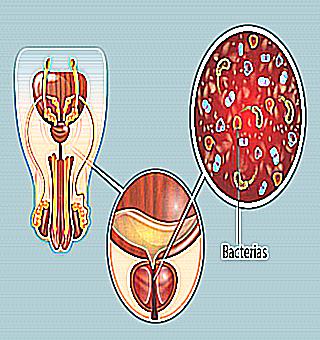Home >
Erectile Dysfunction >
What is prostatitis and how does it manifest itself in men
What is prostatitis and how does it manifest itself in men

The prostate gland is one of the main organs of the male reproductive system. It is located deep in the pelvis, just below the bladder. It has a rounded shape, somewhat reminiscent of a medium-sized chestnut or walnut. In length, as a rule, the prostate does not exceed five centimeters, and in width - three, the mass of the organ varies between 20-25 grams. From the front, the organ is protected by the pubic bone joint, from behind it closely borders on the intestinal wall, from below it is limited by the muscular structures of the small pelvis.
The internal structure of the prostate is seventy percent represented by glandular tissue, the rest is connective tissue structures and smooth muscle fibers. The structural unit of the glandular tissue is small prostatic glands that have the ability to produce a special secret - prostatic juice. Groups of glands of 30-50 pieces form larger elements - lobules. Each of them has its own duct, surrounded by connective tissue and muscle fibers. All lobules carry their ducts to the lumen of the urethra, where they open, merging together on both sides of the seminal tubercle. Outside, the gland is protected by a dense capsule, where the amount of muscle tissue is negligible.
Important: due to the peculiarities of localization, the prostate gland can affect the quality of urination, since, leaving the bladder, the urethra passes between the lobes of the organ. A close location with the rectum makes it possible to perform its palpation examination through rectal access, which is of great diagnostic importance.
Why do we need a prostate
Some authors call the prostate the "second heart" of a man, thus emphasizing the exceptional importance of the organ for the stronger sex. In general, the functions of the prostate gland in men are as follows:
Important: prostate dysfunction can lead to a violation of all types of metabolism, a decrease in the tone of the nervous system and mental disorders. Patients with sexual dysfunction are characterized by apathy and neurasthenia, and are more prone to cardiovascular disorders.
When prostatitis develops
All causes of prostatitis in men can be divided into two main groups:
Other factors that cause prostatitis:
- Sedentary lifestyle and insufficient physical activity.
- Increased body weight and the presence of other endocrine diseases.
- Weak immune system and prone to allergic manifestations.
- Long periods of sexual abstinence or incomplete ending of intercourse.
- Frequently experienced hypothermia.
- Tendency to hold back stool
- Excessive mental and physical stress.
- Malnutrition, when the body lacks trace elements and vitamins.
- The presence of addictions (alcohol, smoking).
Signs of illness
Regardless of what causes prostatitis, the following clinical symptoms come to the fore:
- Violation of urination in the form of a poorly filled or intermittent urine stream, cutting pains accompanying urination, frequent urge to empty the bladder,
- Pain behind the pubis, radiating to the groin and scrotum, pain during defecation and ejaculation.
- Discharge from the urinary tract, the presence of characteristic threads in the urine,
- Increase in body temperature,
- Sexual dysfunction: poor quality of erection, premature ejaculation, blurred sensations at the moment of orgasm, lack of sexual desire,
- Psycho-emotional changes: apathy, irritability, loss of interest in surrounding events, sleep disorders,
- Partial disability
Disease diagnosis
After questioning the patient and clarifying his complaints, the doctor will need the following results:
- palpation examination of the prostate through the rectum,
- standard set of laboratory tests (OAM and UAC),
- US or TRUS of the prostate,
- Bacposement of secretions and prostatic juice, determination of the sensitivity of the pathogen to antibiotics,
- Studies of the cellular composition of the secret,
- PCR to rule out or detect latent infections,
- Spermograms,
- Urofluorometry, to assess the patency of the urethra.
Consequences of prostatitis
It's time to dwell on the dangers of prostatitis and what consequences it can cause for the male body.



























